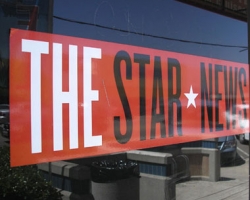By Jon Campbell
Staff Writer
A measure that would have created a local licensing program for tobacco retailers – and established a fee to combat tobacco sales to underage youth – met resistance at a Chula Vista City Council meeting on Tuesday. A convoluted alternate measure, which calls for more research of the issue, passed on a divided vote, with Mayor Cheryl Cox and Councilman Rudy Ramirez voting against, and Councilmembers Pamela Bensoussan, Steve Castaneda and Interim Councilmember Mitch Thompson voting to approve.
The measure would have levied a fee of between $150 and $300 for a tobacco retailer license, as well as fines for violators, and the proceeds collected would have helped fund enforcement efforts in the city. There is currently no enforcement of local and state laws prohibiting underage tobacco sales, according to Chula Vista Police Chief David Bejarano. Bejarano said the department simply doesn’t have the resources to monitor retailers’ compliance. He said the department will respond to specific complaints, but that they’ve received none to date, and no citations for underage sale have ever been issued in the city.
With 119 tobacco retailers currently operating in Chula Vista, the proposed licensing fee would have raised between $17,850 and $35,700 annually for enforcement efforts. A full time police officer costs the city about $125,000 annually, including benefits, so even if the higher fee was instituted, Bejarano said, it would still free up only a small amount of officer enforcement time.
President of the Chula Vista Chamber of Commerce Scott Vinson said his group did not support the proposal.
“When you place this fine on businesses you think it’s going to stop underage smoking, but I don’t think it will,” said Vinson. Vinson also complained the chamber had been left out of the planning process. He said his group was willing to collaborate with city leaders to combat underage tobacco sales, but that his group should have had a chance to participate, as it is their members who will bear the cost.
Much of the night’s discussion revolved around a retailer survey carried out by local non-profit Palavra Tree, with funding from the San Diego County Department of Health and Human Services. The group used underage “decoys” who attempted to purchase tobacco products at local gas stations and other retail outlets, mainly a brand of miniature cigars called “Black and Milds”. According to the study, 88 of 119 stores surveyed sold tobacco products to underage youths during the sting, a rate of 73.9 percent.
A number of public speakers called the statistics from the Palabra Tree study alarming, but some expressed doubts about the survey’s reliability. Ramirez cited questions about the study’s results as one reason for his ‘nay’ vote on the proposal. The Neighborhood Market Association, a trade group representing retailers, also took issue with the numbers, calling them “inflated”.
The group’s President and CEO Mark Arabo cited the results of a recent sting operation by Chula Vista police focused on underage alcohol sales, in which no stores in Chula Vista sold to minors. He said the discrepancy between that survey and the tobacco survey casts doubt on the reliability of the numbers. He also said he found it hard to believe that tobacco retailers would risk the consequences of selling to underage youth.
“They (business owners) wouldn’t compromise their businesses, their livelihoods, for a pack of cigarettes,” said Arabo.
Gary Woodson, Project Director for Palavra Tree and one of the coordinators of the tobacco survey, said he stood by his numbers. The study itself acknowledges that the percentage of successful purchases in 2009 were far higher than studies conducted only a few years ago, and speculated that the choice of products may have affected the results.
The report reflects a high rate of sales of single-item tobacco products, like single cigars or “blunts”, but a much lower percentage of successful cigarette purchases. The study also cited “youth appearance” as a contributing to factor to the high sales rates. The study said the organization selected “decoy youth that appeared to be older than their true age, and were experienced tobacco purchasers.” Woodson said the decoys spoke the “lingo” of a smoker, just like underage smokers would in a real-life situation. One of the paid decoys in attendance said he was nearly 18 when he purchased the tobacco products, and admitted that he is currently a smoker.
Castaneda, a member of the council’s Public Safety Subcommittee, was the driving force behind the proposal, along with Thompson. He said he thought the debate over numbers was missing the point. Castaneda noted that he wanted the city to perform its own study in order to establish undisputed numbers, but that proposal was refused by other council members due to budget concerns. Castaneda said he wouldn’t back down from his effort to reduce young people’s access to tobacco.
“It’s interesting that the people who profit from the sale of tobacco are the only ones who had a problem with the study … it is a major problem and something that needs to be addressed,” said Castaneda.
This is the second tobacco related initiative Castaneda has brought to the council in as many months, following on the heels of a failed effort to restrict tobacco sales near schools.












